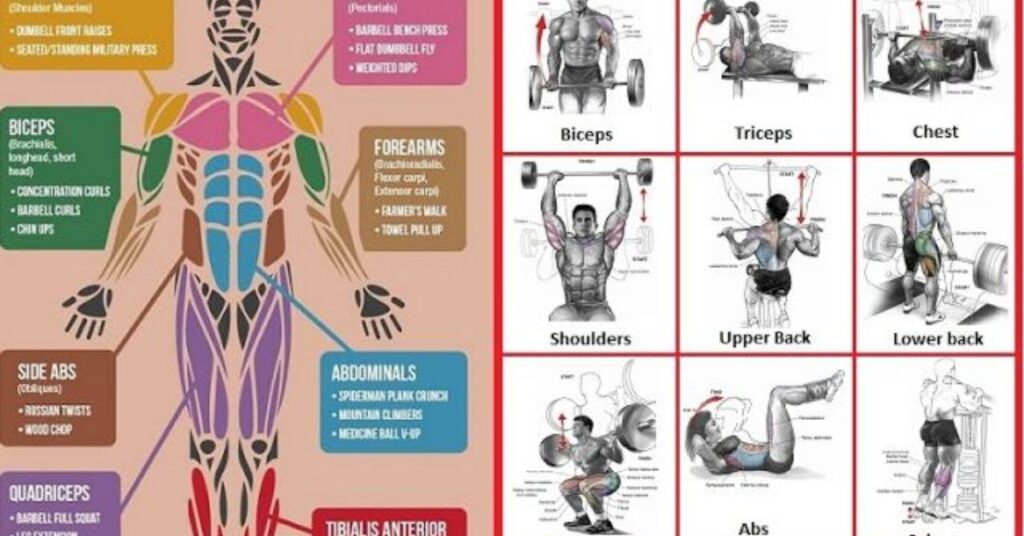Building muscle is a complex but achievable goal that requires a multifaceted approach Combining proper training nutrition and recovery.This comprehensive guide will help you Understand the key components of muscle building and provide you with actionable Strategies to achieve your fitness goals.
The Science Behind Muscle Growth
Muscle hypertrophy (Growth) occurs through a process called muscle protein synthesis (MPS). When you perform resistance trainin you Create microscopic damage to muscle fibers.Your body then repairs and rebuilds these fibers stronger than before leading to increased muscle mass.This process requires adequate protein Calories and recovery time.
The Ultimate Workout Plan for Muscle Gain

Training Principles
- Progressive Overload: Gradually increasing weight, frequency, or repetitions
- Compound Movements: Focusing on exercises that work multiple muscle groups
- Training Volume: Maintaining adequate sets and reps for optimal growth
- Rest Periods: Allowing proper recovery between sets and workouts
Weekly Workout Split
Here’s an effective 5-day training split designed for muscle growth:
| Day | Muscle Groups | Key Exercises | Sets x Reps |
| Monday | Chest & Triceps | Bench Press, Incline Dumbbell Press, Dips | 4 x 8-12 |
| Tuesday | Back & Biceps | Deadlifts, Pull-ups, Barbell Rows | 4 x 8-12 |
| Wednesday | Rest | Active Recovery/Light Cardio | – |
| Thursday | Shoulders & Abs | Military Press, Lateral Raises, Planks | 4 x 8-12 |
| Friday | Legs | Squats, Romanian Deadlifts, Leg Press | 4 x 8-12 |
| Saturday | Arms & Calves | Curls, Pushdowns, Calf Raises | 3 x 12-15 |
| Sunday | Rest | Complete Rest | – |
Exercise Form and Technique
Proper form is crucial for both muscle growth and injury prevention. Key points to remember:
- Maintain controlled movements
- Focus on mind-muscle connection
- Use full range of motion
- Breathe properly during exercises
- Keep proper alignment and posture
Nutrition: The Building Blocks of Muscle
Caloric Requirements
To build muscle you need to be in a caloric surplus. Calculate your maintenance calories and add 300-500 calories for optimal muscle gain without excessive fat accumulation.
Macronutrient Distribution
The ideal macronutrient ratio for muscle building:
| Macronutrient | Percentage | Grams per pound of body weight |
| Protein | 30-35% | 1.6-2.2g |
| Carbohydrates | 45-55% | 2-3g |
| Fats | 20-25% | 0.5-0.6g |
Meal Timing and Frequency
For optimal muscle growth consider these meal timing strategies:
- Pre-workout meal (2-3 hours before):
- Complex carbohydrates
- Moderate protein
- Low fat
- Post-workout meal (within 1 hour):
- Fast-digesting carbohydrates
- High-quality protein
- Minimal fat
- Regular meals throughout the day:
- 4-6 meals spaced evenly
- Protein at each meal
- Balance of all macronutrients
Supplements for Muscle Growth
Essential Supplements
- Protein Powder
- Type: Whey protein isolate or concentrate
- Timing: Post-workout and between meals
- Dosage: 20-30g per serving
- Creatine Monohydrate
- Benefits: Increased strength and muscle volume
- Dosage: 5g daily
- Timing: Any time of day
- BCAAs (Branched-Chain Amino Acids)
- Benefits: Reduced muscle breakdown
- Dosage: 5-10g
- Timing: During workouts or between meals
Optional Supplements
| Supplement | Benefits | Recommended Dosage |
| Beta-Alanine | Improved endurance | 3-5g daily |
| Caffeine | Enhanced performance | 200-400mg pre-workout |
| Fish Oil | Reduced inflammation | 2-3g daily |
| Vitamin D | Hormone optimization | 2000-5000 IU daily |
Recovery and Rest: The Missing Link
Sleep Optimization
Quality sleep is crucial for muscle growth and recovery:
- Aim for 7-9 hours per night
- Maintain consistent sleep schedule
- Create a dark cool sleeping environment
- Limit screen time before bed
Active Recovery Techniques
- Mobility Work
- Dynamic stretching
- Foam rolling
- Joint mobility exercises
- Light Cardio
- Walking
- Swimming
- Cycling at low intensity
Stress Management
Controlling stress is essential for optimal muscle growth:
- Practice meditation or deep breathing
- Maintain work-life balance
- Stay hydrated
- Take regular deload weeks
Common Mistakes to Avoid
Training Mistakes
- Overtraining
- Training too frequently
- Insufficient recovery time
- Excessive volume
- Poor Form
- Rushing through movements
- Using too much weight
- Incomplete range of motion
Nutrition Mistakes
- Inadequate Protein
- Not meeting daily requirements
- Poor protein timing
- Low-quality protein sources
- Insufficient Calories
- Not eating enough for growth
- Irregular meal timing
- Poor food choices
Tracking Progress and Making Adjustments
Measuring Success
Track these key indicators:
- Body measurements
- Weight
- Circumference measurements
- Body fat percentage
- Performance metrics
- Weight lifted
- Reps completed
- Exercise volume
Making Adjustments
Adjust your program based on results:
- If not gaining muscle:
- Increase calories
- Adjust training volume
- Review sleep quality
- If gaining too much fat:
- Reduce caloric surplus
- Increase training intensity
- Add moderate cardio
Long-term Success Strategies
Sustainability
Create sustainable habits:
- Develop a consistent routine
- Choose enjoyable exercises
- Set realistic expectations
- Build a support system
Progressive Goals
Set progressive milestones:
- Short-term (1-3 months)
- Perfect form on key exercises
- Establish consistent routine
- Meet daily nutrition targets
- Medium-term (3-6 months)
- Increase strength by 20%
- Gain 5-10 pounds of muscle
- Maintain consistent progress
- Long-term (6-12 months)
- Achieve desired physique
- Master advanced techniques
- Maintain healthy habits
Conclusion
Building muscle requires dedication, consistency, and attention to detail across training, nutrition, and recovery. Success comes from following a well-structured program while making adjustments based on individual response and progress. Remember that muscle building is a marathon, not a sprint – focus on sustainable practices and steady progress rather than quick fixes.
By following this comprehensive guide and staying committed to your goals, you’ll be well on your way to building the muscular physique you desire. Remember to listen to your body, make adjustments when necessary, and stay consistent with your efforts. The journey of muscle building is as rewarding as the destination itself.
Free quently Asked Question
How long does it take to build noticeable muscle?
With consistent training and proper nutrition, most people can see visible muscle gains in 8-12 weeks.
Should I do cardio while trying to build muscle?
Yes, but limit it to 2-3 moderate-intensity sessions of 20-30 minutes per week to maintain cardiovascular health without hindering muscle growth.
Can I build muscle while losing fat at the same time?
Beginners and those returning to training can achieve this through body recomposition, but it becomes more challenging for advanced lifters.
How much protein do I really need to build muscle?
For optimal muscle growth, consume 1.6-2.2 grams of protein per kilogram of body weight daily.
Is it necessary to take supplements to build muscle?
While supplements aren’t mandatory, protein powder and creatine can help optimize muscle growth when combined with proper training and nutrition.












xohxrt